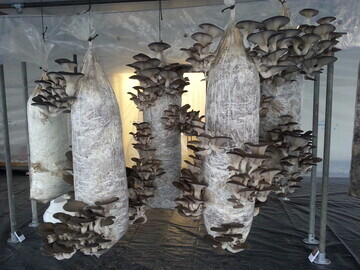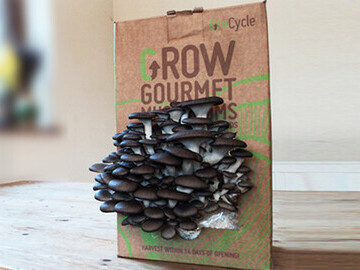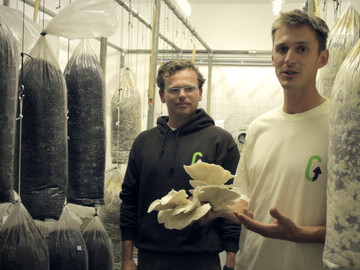The UK’s first urban mushroom farm launches this week- recycling coffee grounds into edible mushrooms.
“It’s crazy that most large cafes are throwing their coffee waste away, we are making it possible to grow food from it instead.”
The UK’s first urban mushroom farm launches this week growing gourmet mushrooms from recycled coffee grounds - showcasing a new model for the future of sustainable food grown in cities.
The team at GroCycle is proud to announce the official opening of the UK’s first Urban Mushroom Farm, where a huge waste stream, coffee grounds, are used to grow protein-rich Oyster mushrooms.
GroCycle Urban Mushroom Farm in Exeter is a showcase for how food can be grown sustainably.
Based in disused office space, the farm takes coffee grounds from local cafés and uses them as a growing medium to produce healthy and delicious Oyster mushrooms.
Coffee waste is a huge problem in the UK. Approximately 80 million cups of coffee are drunk every day in the UK, yet less than 1 per cent of the bean actually ends up in the cup. The vast majority of the remaining grounds are buried using already scarce landfill capacity and decomposing to produce methane, which is some 25 times more harmful to the earth’s atmosphere than CO2.
“It’s crazy that most large cafes are throwing their coffee waste away,” said Adam Sayner, company director. “It is still packed full of nutrients which can be turned into delicious Oyster mushrooms. We are making it possible to grow gourmet food from it instead!”
With mounting evidence of the environmental impact of meat production, the low impact method devised by GroCycle may also present a solution to produce protein-rich food more sustainably.
“Growing mushrooms in this way is absolutely ideal for Urban Agriculture,” said Eric Jong, company director. “It is where both the waste and demand for food are highest. We hope our farm will serve as a flagship model for more urban farms in the future.”
The farm will be officially opened September 23rd by Rob Hopkins, founder of the Transition Town movement at 11:00 am.
GroCycle is part of the growing movement of Social Enterprise. The focus is on business as a positive force for social and environmental good, rather than simply for profit.
End of Release
---------------------------------------------------------------------------------------------------
Notes for Editors:
-Graphics and interviews are available on request. Please email hello@grocycle.com or call 01803 411690
-Oyster mushrooms are 15-25% protein (by dry weight).
-Oyster mushrooms contain ergothioneine, a unique antioxidant exclusively produced by fungi, according to a 2010 study led by Penn State food scientist Joy Dubost. The study found that oyster mushrooms have significant antioxidant properties that protect cells in the body (www.medicalnewstoday.com/releases/29988.php).
-Oyster mushrooms are high in nutrients. According to a study published in "Food Chemistry," oyster mushrooms contain significant levels of zinc, iron, potassium, calcium, phosphorus, vitamin C, folic acid, niacin, and vitamins B-1 and B-2.
-Oyster mushrooms have significant antibacterial activity, according to a 1997 study published in the "Journal of Agricultural and Food Chemistry." The study found that the active compound benzaldehyde reduces bacterial levels. (http://pubs.acs.org/doi/abs/10.1021/jf960876i)
Press release distributed by Pressat on behalf of GroCycle, on Thursday 18 September, 2014. For more information subscribe and follow https://pressat.co.uk/
Urban Agriculture Mushrooms Sustainability Coffee Protein Social Enterprise Environment & Nature Farming & Animals
Published By

01803 411690
hello@grocycle.com
http://www.grocycle.com
Adam Sayner (Director) adam@grocycle.com
Eric Jong (Director) eric@grocycle.com
Visit Newsroom
You just read:
The UK’s first urban mushroom farm launches this week- recycling coffee grounds into edible mushrooms.
News from this source:






